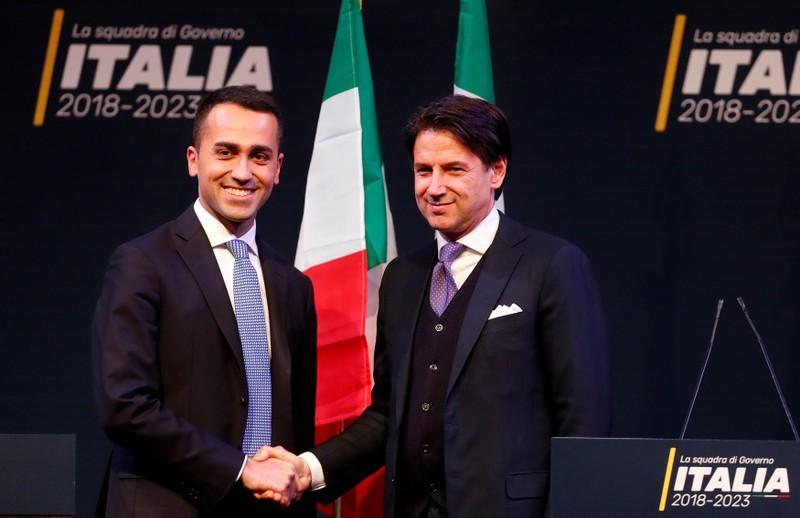By Crispian Balmer
ROME (Reuters) - An attempt by a little-known professor to become Italy’s next prime minister hit a hurdle on Tuesday following allegations that he had inflated his academic credentials.
The anti-establishment 5-Star Movement and the far-right League, which have drawn up a coalition pact aimed at ending months of deadlock, have nominated political novice Giuseppe Conte as the man they want to enact their radical policy plans.
President Sergio Mattarella, who has the final say over who should be prime minister, has yet to endorse their choice, with new concerns over Conte’s resume adding to existing doubts about his lack of experience and limited clout.
After six days of heavy selling, Italy’s financial markets regained some lost ground on Tuesday, although fears the 5-Star and the League might appoint a fiercely eurosceptic figure as economy minister took some steam out of a nascent recovery.
The League and 5-Star last week agreed on a joint platform, promising to slash taxes, roll back pension reform and boost welfare in big-spending programme that risked putting heavily-indebted Italy on a collision course with its European partners.
On Monday they finally put forward Conte’s name for prime minister – a Florence law professor who is close to 5-Star, but has no political base or government background.
In a curriculum vitae (CV) posted by Conte on a law association website, he said he had “perfected his judicial studies” at numerous foreign institutions, including Cambridge University, New York University and the Sorbonne in Paris.
Impact Shorts
More ShortsThe Sorbonne and New York University (NYU) said they could not find any trace of him in their databases.
“That doesn’t necessarily mean he didn’t come here. But we have not yet found his name in our records,” an official at the Sorbonne told Reuters, adding staff would keep on searching through old written records.
Cambridge University declined to comment, but a source said they had not found any evidence he had studied there in September 2001, suggesting instead he might have attended a course run by a third-party in the grounds of Girton College.
“DEFAMATORY CAMPAIGN”
Conte himself made no public comment, but 5-Star issued two statements during the day to defend the professor, saying he had never specified what courses he had taken or claimed to have qualifications that he had not received.
“Conte, like any researcher, went abroad to study, to deepen his knowledge, to perfect his English legal language skills,” the party said, adding that the Italian and international press were deliberately distorting Conte’s record.
“The defamatory campaign is so explicit and crude that it will only strengthen us,” 5-Star added.
Political opponents jumped on the saga to suggest that Conte was not up to running Italy.
“If he didn’t study at NYU, what guarantees are there that the rest of the CV is right? To start with a lie is certainly not the best way to be presented to the head of state as a possible premier,” said Michele Anzaldi, a lawmaker with the centre-left Democratic Party.
5-Star emerged as the largest party in elections on March 4, while a conservative coalition led by the League won the most seats. But both sides fell well short of an absolute majority, leading to months of political deadlock.
A source close to Mattarella said the president had not yet decided how to proceed, adding that any problems that may arise over Conte’s candidacy were not the responsibility of the head of state – an apparent reference to the curriculum issue.
Italian 10-year bond yields have risen nearly 70 basis points since the start of the month, while the cost of insuring against Italian government debt has hit 7-month highs.
A partial recovery on Tuesday was checked by media reports that eurosceptic economist Paolo Savona was in the running to become economy minister in the new government.
The 81-year-old has often said European monetary union was a flawed project that had hurt Italy’s economy.
League leader Matteo Salvini said later that Conte remained the party’s prime minister candidate and that he would like Savona to be economy minister.
In a book due for publication this month, Savona calls Italy’s entry in the euro zone a “historic error” and calls for a “plan B” to be drawn up to allow it to leave the currency bloc with as little damage as possible if it should prove necessary.
“Savona’s background as a vocal critic of Europe’s construction make him the least market-friendly candidate,” Mizuho strategists told clients.
(Additional reporting by Gavin Jones, Steve Scherer and Massimiliano Di Giorgio; Editing by Janet Lawrence and David Stamp)
This story has not been edited by Firstpost staff and is generated by auto-feed.


)

)
)
)
)
)
)
)
)



